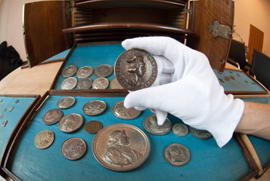Coin safekeeping and storage can be very difficult especially if you are new to coin collection. This is because there are numerous different ways in which you could store your coins and there are too many questions relating to them, which can leave you confused. Alongside, you have to be very careful while storing your coin collection because potential hazards could lead to the destruction of your collectible all together.
Storage and hazards go hand in hand. While you can overcome some hurdles, you just have to risk the others. However, don’t be under the impression that it is possible to replace your valuables. These prized possessions, once damaged can be nigh impossible to substitute.
 Right from handling to contamination and pollution, you have to make sure you protect your coin from all these factors. Also, burglar invasion, fire possibilities, and home invasions add to the risks and safety concerns. Any of these can rip you off your collection in seconds. While some things can’t be avoided, you can take care of the other things and protect your coins in a number of ways. Protecting your coins can also be expensive and surely, because of this, some of you may prefer taking the risk. However, once you have a large collection, the best thing to do would be to secure it in a bank in a safety deposit box.
Right from handling to contamination and pollution, you have to make sure you protect your coin from all these factors. Also, burglar invasion, fire possibilities, and home invasions add to the risks and safety concerns. Any of these can rip you off your collection in seconds. While some things can’t be avoided, you can take care of the other things and protect your coins in a number of ways. Protecting your coins can also be expensive and surely, because of this, some of you may prefer taking the risk. However, once you have a large collection, the best thing to do would be to secure it in a bank in a safety deposit box.
Coins are comparable to humans in that they prefer low humidity and moderate temperatures. This is the reason why it is a very bad idea to store gold coins in the basement or the attic. Not only will you coins suffer but the media will suffer too if you expose them to low humidity and extreme temperature. Heat can cause PVC damage if you use flips containing PVC to hold your coins.
Thus, you should not use plastic flips containing PVC or plastic-vinyl because even these albums may contain the chemical. To differentiate between safe plastics and hazardous plastics, you can check out the texture. While those made out of PVC are pliable and soft, safer plastic flips are hard and stiff. It is also not a good idea to store paper money in PVC laden flips. PVC is dangerous to both coins and paper.
The weight of coins is no joke. Even a small box full of coins can weigh enough to crash the closet shelf down under the weight. It is also not advisable to store the coins in the freezer because crooks these days search the freezer first. You can choose a floor safe or a wall safe with a proper lock. A burglar proof safe is ideal because a fire proof safe usually contains chemicals, which are hazardous to coins. Storing old coins can be a little tricky. You should find a place, which is not detectable easily. Get ingenious and think. Bury your box under a pile of old clothes for example. No one will think of checking there. Gold coins and silver coins are, however, best stored in a bank.
It’d be ideal to keep an eye on your coins as they increase in number. Once you have a substantial number, you can sort them out. Pick any value, such as $100, and then store all coins above that value in a hard and inert plastic storage case. These are highly protective and will keep your coins safe. They are the best choice for uncirculated coins. Choose coin storage boxes or tubes made out of inert plastic to store coins of the value below the value you chose. Don’t overlook any coin and be consistent with the storage system. Making a list will take you very far. It will help you keep a track of all the coins you have and how you have stored them. Mention the mintmark and date of each coin along with its unique aspects so that finding them is easy. Also, it’ll be easier when the time comes for you to start selling your coins.